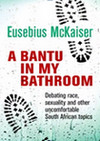
Eusebius Mckaiser's controversial first book has been received with critical acclaim.
Promoting his book A Bantu in my Bathroom Eusebius McKaiser spoke to an audience at Rhodes University on 3 May about the topics he tackles, the idea of living the authentic life and his fears surrounding Rhodes students’ lack of critical engagement with political and social issues.
An old Rhodian himself, McKaiser explained that he has thus far chosen not to promote his book in Grahamstown, his hometown, reasoning that he perceives critical disengagement and apathy as being particularly prevalent amongst Rhodes students for the issues he address in his book.
“I’m not convinced Rhodes students have a critical engagement with political and social issues,” said McKaiser, criticising Rhodes students and staff’s inability to connect academic debate to South African life.
Many of the essays are prefaced by anecdotes from McKaiser’s days as a student at Rhodes. “The material in the book is profoundly emotional,” said McKaiser, elaborating that he therefore delayed promoting the book in Grahamstown as he was, “scared of disinterest” felt by the students.
A Bantu in my Bathroom is McKaiser’s self-described “self-indulgent” attempt to revive a genre of longer essays on political and social issues written out of compulsion to express feelings about sexuality, race and politics in South Africa. He tackles issues such as his own experience of homosexuality and coming out while at Rhodes as well as issues such as whether or not ‘black people’ can be racist.
Simply the mention of some of the essay’s titles and topics caused a stir in the audience. “I heard they took down some of my posters because they didn’t agree with the title of my book. That’s great, I love a little controversy,” said McKaiser, rubbing his hands together and grinning.
Nic Moolman, an old Rhodian and former peer of McKaiser, raised the issue of hypocrisy in society that creates a fake acceptance rather than true understanding and equality with regard to race and sexuality.
McKaiser supported this comment with his rhetoric concerning the authentic life. He suggested that South Africans conduct themselves with the utmost integrity in every aspect of life and that “own[ing] your own story” is central to identity.
By Chelsea Haith
Source: Oppidan Press
